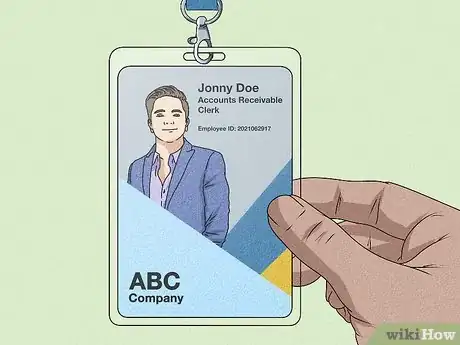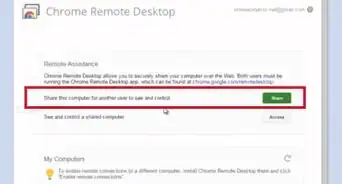This article was co-authored by Harish Chandran, PhD. Harish Chandran is the Engineering Site Lead and Senior Staff Research Engineer at DeepMind, where he leads the engineering efforts to integrate AI research results into Google products. Harish received his PhD in Computer Science from Duke University in 2012. While in graduate school, he worked as a Teaching Assistant, helping undergraduate students learn about algorithms and data structures. He has experience in DNA self-assembly, evolutionary algorithms, computational neuroscience, complexity theory, computer architecture, and super-computing.
This article has been viewed 51,532 times.
Once you have absorbed all the orientation material on the very first day of your job, it’s time to hit the road with a concrete plan of action. You shouldn't undermine the significance of the first few days of your job, since this is the best time to create a solid first impression. If you come out of the gates strong, you will prompt your coworkers to collaborate with you and enable your success at work.
Steps
Starting Off Strong
-
1Understand your role thoroughly to gain a comprehensive vision. The most important thing for you to do at first is to understand your role from multiple perspectives.
- This will allow you to develop a plan for what you intend to do over the course of your tenure with the company.
- Your plan should not be limited to your job description, but should include a vision of how your work relates to other people within the organization.
- For example, certain reports that you will create at the end of the month may be used by a team in another department.
- Therefore, it's imperative that your vision accounts for the impact of your work throughout the entire company.
-
2Learn about the business to see the big picture. Take time to learn about the business's history and understand what the business stands for.[1]
- You should know the details of the products and services that the company exists to deliver.
- Learning about the business will give you a chance to understand how your role fits into the bigger picture.
Advertisement -
3Make one-on-one connections. Don’t just show up at work and sit in your cubicle all day long without talking to anyone.[2]
- Though it’s important to do your work, you should also branch out and talk to your colleagues.
- After you establish yourself as a reliable and hard-working employee, take some time to go out and interact with your coworkers in a non-professional setting.
- Try inviting them out to lunch, or for drinks after work.
- Getting to know them on a personal level will make sure they know who you are.
-
4Build relationships with people in key positions. Meeting and building relationships with the movers and shakers within the business is a great way to gain connections and business insight.[3]
- Get to know the the people who run the show and have decision-making authority, to gain insight regarding how the business is run and decisions are made.
-
5Understand the expectations of your bosses. Although building relationships with your superiors is a great way to make connections, you should also spend time learning about what they expect from you.[4]
- This can include the expectations listed in your job description, as well as expectations that are more informal, such as networking and offering your help.
- If you can help your bosses achieve their goals, this will be a huge plus for you.
-
6Stay proactive to maximize your time on the job. You should start accomplishing your goals and making connections as soon as possible to get the greatest benefit from your position.
- You have the first few days on the job to create a good impression and understand everything you need to be successful in the time ahead.
Developing a Road Map
-
1Conduct an informational interview with your boss. Conducting an informational interview with your boss can help you develop your road map based on your boss's vision for the company and your role.[5]
- This will also go a long way towards developing a healthy professional relationship with your boss.
- Your plans and goals will be accomplished in the best possible manner if you line them up well with his or her needs.
- You can gain an edge by learning how you can help him or her succeed and how you can collaborate.
- Get information about what they want, what their approach is towards routine work and assignments, and how you can go the extra mile to exceed expectations.
-
2Draft a 30/60/90 day plan to map out your success. Your early conversations with your manager should focus on creating a plan for your first 90 days at work, and track those goals on a monthly basis.[6] [7]
- You should clearly state what you intend to accomplish in those first three months.
- Your plan should also reflect your interactions with your teammates.
- For example, you should include a goal of maintaining focused listening to earn your coworkers' trust and demonstrate that you are a 100% committed team player.
- This will ensure that you are accepted gladly and warmly.
-
3Set realistic goals with your boss. Your career-related goals should be set in collaboration with your boss, so that you can find common ground with him or her.
- Get your goals reviewed by your boss so that you get their stamp of approval.
- Your boss can also let you know which goals require slight modification in light of your job duties and the organization’s culture.
- You should set a reasonable bar of accomplishment that is neither too high nor too low.
Ensuring Solid Communication
-
1Expand your network and include your coworkers. Make sure to avoid limiting your communication to only your bosses, rather include everyone who has a good eye on the health of the company.[8]
- Connect with people who can offer information and advice beyond the regular communication channels.
- Sometimes a job title might not clearly demonstrate the influence your colleague may have.
- It’s your duty to gain a deeper understand of each person by digging deeper into your relationships with each individual.
-
2Extend your assistance to those who need it. If someone can benefit from your assistance or advice, help them out to gain their respect and trust.
- Go beyond your normal responsibilities and offer to help people with their projects, as long as your own work will not go unattended.
- Go out of your way to tell people that you are willing to help, even if it demands some extra effort on your end.
-
3Thank people for their help habitually. Irrespective of anyone’s job title, whenever someone extends a helping hand, make sure to return a thank you.
- You should show your colleagues the respect they deserve and indicate that you are grateful when they do something for you.
-
4Inform your manager when you complete goals and projects. Focus on achieving your goals and make sure you let your manager know when you complete something worthy of mention.[9]
- Regular communication with your manager will help you make course corrections.
- At the end of your 90-day plan, show your manager what you have accomplished.
Avoiding Career-Harming Mistakes
-
1Don’t act like a know-it-all. Even if you are one of the most qualified people at the company, avoid coming off as cocky or arrogant.
- You are expected to be humble and learn as much as you can.
- You will get a lot of time later on to show your genius.
- Listen carefully and talk less.
-
2Avoid trying to do take on too much work. Don't constantly stay late just to show that you are committed.[10]
- The expectations you set at the beginning can go a long way, so make sure you are putting in quality time, instead of just a large quantity of time.
-
3Withdraw from gossip. You will find friends in your new workplace, but always remember to present yourself as professionally as possible.
- Don't speak negatively about your coworkers or boss.
- If you have legitimate complaints, address them directly with those involved.
-
4Stay positive about the company. Even if you don't agree with things that are happening within the company, or the direction that it's going, don’t speak negatively about what is going on in the organization.
- Avoid making too many comparisons with your old job, and work to create positive change where you can.
Expert Q&A
Did you know you can get expert answers for this article?
Unlock expert answers by supporting wikiHow
-
QuestionHow can I help my new employees be successful?
 Harish Chandran, PhDHarish Chandran is the Engineering Site Lead and Senior Staff Research Engineer at DeepMind, where he leads the engineering efforts to integrate AI research results into Google products. Harish received his PhD in Computer Science from Duke University in 2012. While in graduate school, he worked as a Teaching Assistant, helping undergraduate students learn about algorithms and data structures. He has experience in DNA self-assembly, evolutionary algorithms, computational neuroscience, complexity theory, computer architecture, and super-computing.
Harish Chandran, PhDHarish Chandran is the Engineering Site Lead and Senior Staff Research Engineer at DeepMind, where he leads the engineering efforts to integrate AI research results into Google products. Harish received his PhD in Computer Science from Duke University in 2012. While in graduate school, he worked as a Teaching Assistant, helping undergraduate students learn about algorithms and data structures. He has experience in DNA self-assembly, evolutionary algorithms, computational neuroscience, complexity theory, computer architecture, and super-computing.
Machine Learning Engineer & PhD in Computer Science, Duke University Machine Learning Engineer & PhD in Computer Science, Duke UniversityExpert Answer
Machine Learning Engineer & PhD in Computer Science, Duke UniversityExpert Answer -
QuestionHow long does it take to settle into a new job?
 Harish Chandran, PhDHarish Chandran is the Engineering Site Lead and Senior Staff Research Engineer at DeepMind, where he leads the engineering efforts to integrate AI research results into Google products. Harish received his PhD in Computer Science from Duke University in 2012. While in graduate school, he worked as a Teaching Assistant, helping undergraduate students learn about algorithms and data structures. He has experience in DNA self-assembly, evolutionary algorithms, computational neuroscience, complexity theory, computer architecture, and super-computing.
Harish Chandran, PhDHarish Chandran is the Engineering Site Lead and Senior Staff Research Engineer at DeepMind, where he leads the engineering efforts to integrate AI research results into Google products. Harish received his PhD in Computer Science from Duke University in 2012. While in graduate school, he worked as a Teaching Assistant, helping undergraduate students learn about algorithms and data structures. He has experience in DNA self-assembly, evolutionary algorithms, computational neuroscience, complexity theory, computer architecture, and super-computing.
Machine Learning Engineer & PhD in Computer Science, Duke University Machine Learning Engineer & PhD in Computer Science, Duke UniversityExpert AnswerIt's going to be different for everyone. Not only does it depend on your personality, but it also depends on the role and the company culture. Don't try to worry too much about how long this process takes. You'll get comfortable soon enough. Just focus on doing good work and making a great first impression.
Machine Learning Engineer & PhD in Computer Science, Duke UniversityExpert AnswerIt's going to be different for everyone. Not only does it depend on your personality, but it also depends on the role and the company culture. Don't try to worry too much about how long this process takes. You'll get comfortable soon enough. Just focus on doing good work and making a great first impression. -
QuestionWhy are all of my new employees so unproductive?
 Harish Chandran, PhDHarish Chandran is the Engineering Site Lead and Senior Staff Research Engineer at DeepMind, where he leads the engineering efforts to integrate AI research results into Google products. Harish received his PhD in Computer Science from Duke University in 2012. While in graduate school, he worked as a Teaching Assistant, helping undergraduate students learn about algorithms and data structures. He has experience in DNA self-assembly, evolutionary algorithms, computational neuroscience, complexity theory, computer architecture, and super-computing.
Harish Chandran, PhDHarish Chandran is the Engineering Site Lead and Senior Staff Research Engineer at DeepMind, where he leads the engineering efforts to integrate AI research results into Google products. Harish received his PhD in Computer Science from Duke University in 2012. While in graduate school, he worked as a Teaching Assistant, helping undergraduate students learn about algorithms and data structures. He has experience in DNA self-assembly, evolutionary algorithms, computational neuroscience, complexity theory, computer architecture, and super-computing.
Machine Learning Engineer & PhD in Computer Science, Duke University Machine Learning Engineer & PhD in Computer Science, Duke UniversityExpert AnswerYou may not like this answer, but it's possible that your onboarding process is the problem. If all of your new hires seem perpetually out of the loop and confused, it's on you, not them. Make sure that you're building a productive and comprehensive training program and take a good look at your current materials to see what you're leaving out.
Machine Learning Engineer & PhD in Computer Science, Duke UniversityExpert AnswerYou may not like this answer, but it's possible that your onboarding process is the problem. If all of your new hires seem perpetually out of the loop and confused, it's on you, not them. Make sure that you're building a productive and comprehensive training program and take a good look at your current materials to see what you're leaving out.
References
- ↑ http://99u.com/articles/7303/the-first-90-days-your-road-map-for-success-at-a-new-job
- ↑ http://99u.com/articles/7303/the-first-90-days-your-road-map-for-success-at-a-new-job
- ↑ http://www.theladders.com/career-advice/build-relationships-early-for-job-success
- ↑ Harish Chandran, PhD. Machine Learning Engineer & PhD in Computer Science, Duke University. Expert Interview. 5 June 2019.
- ↑ http://www.theladders.com/career-advice/build-relationships-early-for-job-success
- ↑ http://99u.com/articles/7303/the-first-90-days-your-road-map-for-success-at-a-new-job
- ↑ http://www.theladders.com/career-advice/build-relationships-early-for-job-success
- ↑ http://www.theladders.com/career-advice/build-relationships-early-for-job-success
- ↑ http://99u.com/articles/7303/the-first-90-days-your-road-map-for-success-at-a-new-job














































































